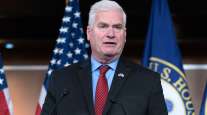Senior Reporter
Supply Chain Legislation Awaits Votes in House, Senate

[Stay on top of transportation news: Get TTNews in your inbox.]
With the congressional August recess fast approaching, senior transportation policymakers are calling for passage of several big picture supply chain-centric bills.
A bill recently introduced in the Senate meant to improve freight rail connectivity is the latest in this series of measures awaiting consideration in Congress. The Reliable Rail Service Act, sponsored by Sens. Tammy Baldwin (D-Wis.) and Roger Marshall (R-Kan.), would pursue certain updates to the operations at the Surface Transportation Board. Doing so, the sponsors argued, would promote reliability across the freight rail network.
“Ensuring our agriculture, energy, and manufacturing businesses have reliable rail service will be crucial in leveling the playing field for Wisconsin businesses who depend on rail service and helping cut costs for working families,” Baldwin said on June 28.
“I frequently hear from Kansans that the service of Class 1 [freight] railroads is not living up to the expectations,” added Marshall. “These service failures hurt our shippers who use the rail to deliver their products to key export facilities.”
The bill would seek to “provide transparency for all stakeholders while improving [Surface Transportation Board’s] oversight to help address our nation’s freight railroad supply chain,” per background information the sponsors provided.

Cantwell
Meanwhile, Commerce Committee Chairwoman Maria Cantwell (D-Wash.) has been urging colleagues to support the bipartisan Railway Safety Act. The chairwoman of the freight policy panel pointed to the bill’s potential safety benefits as she cited data and an interactive map produced by the National League of Cities regarding train derailments.
“Communities nationwide are subjected to derailments every day, and it’s only a matter of time before the next disaster like East Palestine [Ohio] happens,” Cantwell said in June. “This new map by the National League of Cities shows exactly why it is time for the Senate to get on board and pass the bipartisan Railway Safety Act.”

Brown and Vance
The committee approved the bill in May by a 16-11 vote. Senate Democratic leaders have yet to schedule its floor consideration. Co-sponsors include Ohio Sens. J.D. Vance (R) and Sherrod Brown (D). “We built a broad, bipartisan coalition that agree on these common-sense safety measures that will finally hold big railroad companies like Norfolk Southern accountable,” said Brown. Specifically, the bill would promote the safe transport of freight along rail lines by partly targeting guidance at the Federal Railroad Administration and the Pipeline and Hazardous Materials Safety Administration. The bill also would mandate certain defect-detection technology and equip state agencies with additional information about the hazardous materials transported by rail.
On the other side of the Capitol, committee-passed legislation tackling truck parking concerns, the federal permitting process and supply chain regulations have yet to be scheduled for a vote on the House floor.

Bost and Craig
Among the bills approved in committee was the Truck Parking Safety Improvement Act. The bipartisan parking bill is sponsored by Reps. Mike Bost (R-Ill.) and Angie Craig (D-Minn.). “I grew up in a family trucking business,” Bost explained. “I understand how difficult, and oftentimes dangerous, it can be when America’s truckers are forced to park in an unsafe location.”
The freight and trucking sectors continue to raise concerns about a lack of parking for commercial drivers. In 2022, the American Transportation Research Institute ranked inadequate access to parking third on its “Critical Issues in the Trucking Industry.”

Graves
“The Biden administration’s big spending, anti-energy agenda led to sky-high inflation and exacerbated a critical supply chain crisis,” Transportation and Infrastructure Committee Chairman Sam Graves (R-Mo.) said shortly after approving the bills in May. “The committee took action to strengthen our supply chain in numerous ways by removing regulatory barriers, improving supply chain efficiency and promoting smarter infrastructure investment.”
This summer, President Joe Biden and senior members of his administration intend to remind constituents and stakeholders of ongoing investments along supply chain corridors. The $1.2 trillion Infrastructure Investment and Jobs Act, enacted in 2021, dedicates about half of the law’s funding for surface transportation programs and operations.
“Critical supply chains are significantly more fluid and resilient than they were when the president took office,” according to a report from the White House issued in June. “Today, we see increased access to transportation and warehousing capacity and equipment, solid throughput at the ports, improved delivery times, greater ocean shipping reliability, and steady declines in transportation costs.”
I signed a bipartisan infrastructure law that’s already funding 35,000 projects across the country.
Bridges, tunnels, internet, airports – built by union workers and with construction materials made in America.
https://t.co/jjdrPpL6Ga. — President Biden (@POTUS) June 28, 2023
The U.S. Department of Transportation recently announced the availability of $5.5 billion for a trio of grant programs pertaining to surface transportation projects that enhance supply chain connectivity.
Secretary Pete Buttigieg on June 27 said, “From fixing rural roads that would otherwise have trouble getting federal funding, to addressing some of the largest and most recognizable bridges and tunnels in the country, the funds in these three programs are supporting transformational infrastructure projects across the nation.”
Want more news? Listen to today's daily briefing below or go here for more info:




